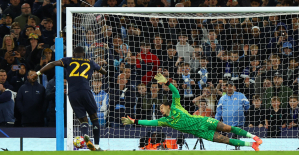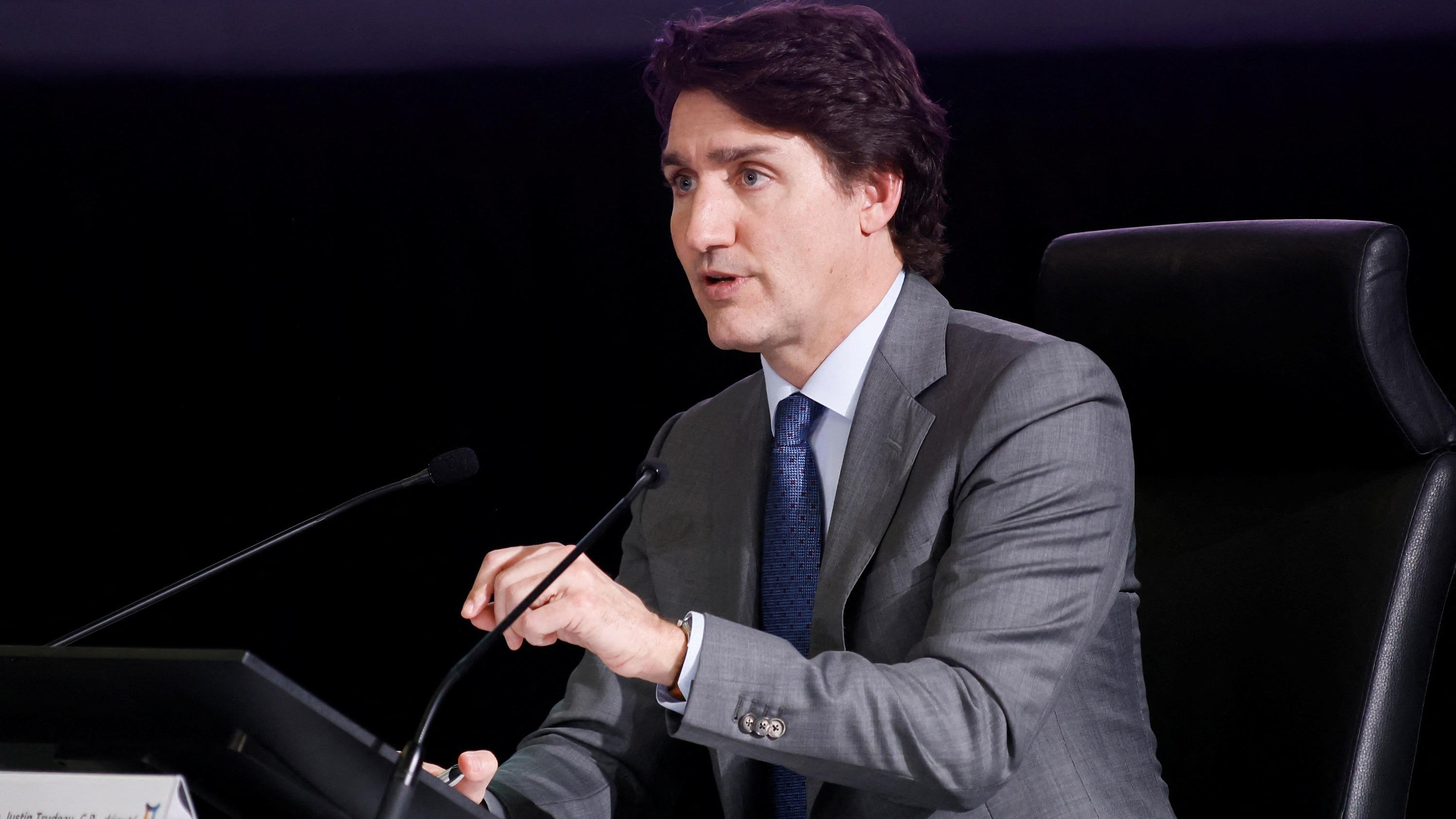The digital bank N26 is taking the first step on the way to the stock market: ten years after it was founded, the company will operate as a stock corporation (AG). That's what co-founder and CEO Valentin Stalf says in an interview with WELT. He is optimistic that N26 will be able to convince new customers in the long term, despite cheaper competitors such as DKB - provided the regulators let them. In addition, he wants to offer savings products in the future and compete with neo-brokers like Trade Republic. The future chairman of the supervisory board, Marcus Mosen, explains how the new body wants to help appease the critical bank supervisors.
WORLD: Mr. Stalf, N26 is legally changing from a GmbH to a stock corporation. When is the IPO due?
Valentin Stalf: We have always said that we want to further professionalize the company, also with a view to a possible IPO. Of course, this transformation is a step towards that. However, in view of the difficult stock market environment, it will certainly be a few more years before we go public. So we can't give a specific date.
WORLD: Companies that are not yet making a profit are currently punishing the capital markets mercilessly. N26 reported a loss of €172 million on gross earnings of €182 million last year.
Stalf: Calculated per customer, we are operationally very profitable. Last year we raised over 700 million euros in equity and of course invest this in the expansion of our product, the development of the team and in customer acquisition. As a result, we will spend more money in the short term this year than we earn. But we will become profitable as a company in about the next two years. In general, it is only a good time to go public when profitability is within reach.
WORLD: That means: An IPO should take place within the next two years?
Stalf: No, it can definitely take longer. But we are now making the company fit. Whether this will be followed by an IPO or first another round of financing with private venture capital is open - depending on the stock market environment and other factors.
WORLD: The sluggish stock market is not just a problem for companies. In view of falling prices and inflation, private individuals also have little desire to deal with their finances. How much does that affect you as a provider who wants to turn banking via app into a lifestyle product?
Stalf: The trend towards cashless payments in stores and in e-commerce is unbroken. We don't feel the reluctance to buy because an increasing proportion of all purchases are made by card. In addition, many more people are doing their banking on their smartphones than just a few years ago. This is the real growth driver for us. Another positive factor is that we are seeing central bank interest rates rising for the first time since the company was founded.
WORLD: How so?
Stalf: The European Central Bank (ECB) is finally paying interest on the money we park with them again. A calculation example: The average customer has 3000 euros in his account. If the ECB pays us two percent for this, we earn 60 euros per customer per year – a good contribution to profitability.
WORLD: Wouldn't it be fair to involve customers and finally pay them interest on their account balances?
Stalf: Absolutely. Our teams are already working on additional savings products with interest. We have taken a first step: we were one of the first banks to abolish negative interest rates on high balances.
WORLD: The basic idea of N26 is to give customers easier access to the account via app than traditional banks. But their apps keep getting better. Don't you have to go public while you still have a technological edge?
Stalf: I see it very differently. We continue to see massive market share shifts towards banks that understand technology. Today we have eight million customers in 24 countries in Europe because the demand for mobile banking is high. Our core competence remains digital development - from the simple opening of an account to the quick setup of sub-accounts to sharing money with friends. We just launched a crypto product that makes it intuitive to trade virtual currencies. Next year we plan to expand this to stocks to get our users ready when the stock markets pick up again.
WORLD: There are already successful German FinTechs such as Trade Republic and Scalable Capital in this area. Wouldn't it be more logical for N26 to merge with one of these providers to create a true global champion from Germany?
Stalf: Of course it's exciting when strong companies join forces. We keep looking at options like this. But in the trading space, we decided to build our own solution, which is 100 percent N26.
WORLD: But what is your unique selling proposition in the long run? You don't want to be the cheapest provider. Depending on the model, your customers pay for credit cards and ATMs. However, a classic direct bank such as DKB, which has won many customers with its free current account and unlimited free use of ATMs, is also expanding its Berlin team for app development - including for stock trading via smartphone. Doesn't that worry you?
Stalf: You are comparing us to one of the few cheapest providers on the German market. Across the banking world, people can save money by switching to us. In addition, you not only get a cheap account, but one of the best digital banking products in the world. Banks that get this right will win the customers of the next ten years. The market for such products for private investors is huge. There is room for multiple providers.
WORLD: Is an IPO the only option for your venture capitalists to exit? Or is a sale to a major bank an option that wants to secure such digital competence?
Stalf: From today's perspective, such a takeover by a traditional company is the least likely option. However, if you had asked me five years ago, my answer might have been different. You see: ten years ago we founded the company from the living room couch, so to speak, with 20,000 euros in seed capital. Today N26 is worth several billion euros. The future is unpredictable.
WORLD: With Tencent, N26 has had a large Chinese online group among its investors since 2018. Do you see that as a danger in view of the current global political discussions?
Stalf: I'm glad that we have many strong international investors on board. Tencent has invested in many very successful Western companies, such as Tesla, Snapchat, and Spotify. However, the influence of the Chinese financiers with us is limited because they only own a few percent of the shares. And our contact person as management is first and foremost our supervisory board anyway.
WORLD: The German banking regulator is currently slowing down your further growth. For a year now, BaFin has only allowed you to take on 50,000 new customers per month in order to limit the risk. The Italian supervisors even completely forbid you from acquiring new customers. The problem must be solved before a possible IPO, right?
Stalf: From my point of view, the overall cooperation with the regulators in Europe works very well. We are in close contact with the various contacts in Europe. In the end, the regulators have to decide when we can grow again without growth restrictions. Of course, that has to be fixed long before the IPO.
World: Some commentators have recommended N26 a fresh start in terms of personnel in order to respond to this problem. How does the new supervisory board take this into account when the chairman of the supervisory board, Marcus Mosen, was already on the advisory board of the bank subsidiary?
Stalf: There has never been a supervisory board in this form at group level before. We reorganized it overall and were able to recruit very experienced personalities for this. Marcus Mosen in particular brings his extensive knowledge of the development of N26 in recent years, combined with his payment expertise, to the new committee.
WORLD: Mr. Mosen, do you see it the same way?
Marcus Mosen: The Supervisory Board is completely new with people who have a relevant professional background and are very familiar with regulation and governance. My deputy Jörg Gerbig, for example, is the operational director of the delivery service Just Eat Takeaway and is very familiar with the development of a global group. I myself was managing director of the financial service providers Concardis and Easycash, both of which were regulated by BaFin. There are also other experienced people, real big caliber.
WORLD: Barbara Roth is also new to the supervisory board. The lawyer is the internal chief controller of Deutsche Börse AG. Is it your joker against BaFin?
Mosen: I wouldn't call them jokers. But it is certainly good that she has extensive experience with the topic of regulation. She really brings a lot of knowledge with her.
WORLD: What criteria did you use to select the five members of the Supervisory Board?
Mosen: We wanted a body that complemented each other in terms of their competencies. Our former chief representative, the lawyer Robert Kilian, is returning to N26 as a member of the supervisory board. He knows N26 very well. The CFO of Axel Springer, Julian Deutz, on the other hand, has corporate experience.
WELT: Axel Springer, the company in which WELT also appears, has worked hard on its culture in recent years to transform itself from a newspaper publisher into an agile international technology and media company. How do you ensure that N26 doesn't go from a start-up to a sluggish corporation in the first place?
Mosen: Although I'm a real boomer in terms of age, I'm so active in the FinTech scene that I hope to bring a lot of dynamism to it. I'm also quite sure about my future colleagues on the Supervisory Board.
"Everything on shares" is the daily stock exchange shot from the WELT business editorial team. Every morning from 7 a.m. with the financial journalists from WELT. For stock market experts and beginners. Subscribe to the podcast on Spotify, Apple Podcast, Amazon Music and Deezer. Or directly via RSS feed.

 Rishi Sunak wants a tobacco-free UK
Rishi Sunak wants a tobacco-free UK In Africa, the number of millionaires will boom over the next ten years
In Africa, the number of millionaires will boom over the next ten years Iran's attack on Israel: these false, misleading images spreading on social networks
Iran's attack on Israel: these false, misleading images spreading on social networks Iran-Israel: David Cameron wants the G7 to impose “coordinated sanctions” on Iran
Iran-Israel: David Cameron wants the G7 to impose “coordinated sanctions” on Iran New generation mosquito nets prove much more effective against malaria
New generation mosquito nets prove much more effective against malaria Covid-19: everything you need to know about the new vaccination campaign which is starting
Covid-19: everything you need to know about the new vaccination campaign which is starting The best laptops of the moment boast artificial intelligence
The best laptops of the moment boast artificial intelligence Amazon invests 700 million in robotizing its warehouses in Europe
Amazon invests 700 million in robotizing its warehouses in Europe Boeing tries to defuse the long-haul crisis
Boeing tries to defuse the long-haul crisis Solar panels: French manufacturer Systovi announces the cessation of its activities due to “Chinese dumping”
Solar panels: French manufacturer Systovi announces the cessation of its activities due to “Chinese dumping” Tesla: canceled in court, Musk's huge compensation plan will again be submitted to shareholders
Tesla: canceled in court, Musk's huge compensation plan will again be submitted to shareholders Two, three or a hundred euros: who are the most generous customers with tips?
Two, three or a hundred euros: who are the most generous customers with tips? Bruno Vandelli: one year suspended sentence required against the choreographer for corruption of a minor
Bruno Vandelli: one year suspended sentence required against the choreographer for corruption of a minor Jul fills the Stade de France and the Vélodrome in record time
Jul fills the Stade de France and the Vélodrome in record time Immersion among the companions of the Liberation
Immersion among the companions of the Liberation Provence-Alpes-Côte d’Azur releases several hundred thousand euros for the promotion of the work of Marcel Pagnol
Provence-Alpes-Côte d’Azur releases several hundred thousand euros for the promotion of the work of Marcel Pagnol Skoda Kodiaq 2024: a 'beast' plug-in hybrid SUV
Skoda Kodiaq 2024: a 'beast' plug-in hybrid SUV Tesla launches a new Model Y with 600 km of autonomy at a "more accessible price"
Tesla launches a new Model Y with 600 km of autonomy at a "more accessible price" The 10 best-selling cars in March 2024 in Spain: sales fall due to Easter
The 10 best-selling cars in March 2024 in Spain: sales fall due to Easter A private jet company buys more than 100 flying cars
A private jet company buys more than 100 flying cars This is how housing prices have changed in Spain in the last decade
This is how housing prices have changed in Spain in the last decade The home mortgage firm drops 10% in January and interest soars to 3.46%
The home mortgage firm drops 10% in January and interest soars to 3.46% The jewel of the Rocío de Nagüeles urbanization: a dream villa in Marbella
The jewel of the Rocío de Nagüeles urbanization: a dream villa in Marbella Rental prices grow by 7.3% in February: where does it go up and where does it go down?
Rental prices grow by 7.3% in February: where does it go up and where does it go down? Europeans: the schedule of debates to follow between now and June 9
Europeans: the schedule of debates to follow between now and June 9 Europeans: “In France, there is a left and there is a right,” assures Bellamy
Europeans: “In France, there is a left and there is a right,” assures Bellamy During the night of the economy, the right points out the budgetary flaws of the macronie
During the night of the economy, the right points out the budgetary flaws of the macronie Europeans: Glucksmann denounces “Emmanuel Macron’s failure” in the face of Bardella’s success
Europeans: Glucksmann denounces “Emmanuel Macron’s failure” in the face of Bardella’s success These French cities that will boycott the World Cup in Qatar
These French cities that will boycott the World Cup in Qatar Champions League: “It’s painful, but we have to learn,” says Arteta
Champions League: “It’s painful, but we have to learn,” says Arteta Champions League: “Madrid never dies”, says Ancelotti
Champions League: “Madrid never dies”, says Ancelotti Champions League: Manchester City played “exceptionally”, according to Guardiola
Champions League: Manchester City played “exceptionally”, according to Guardiola Champions League: video summary of the Manchester City-Real Madrid clash
Champions League: video summary of the Manchester City-Real Madrid clash


















